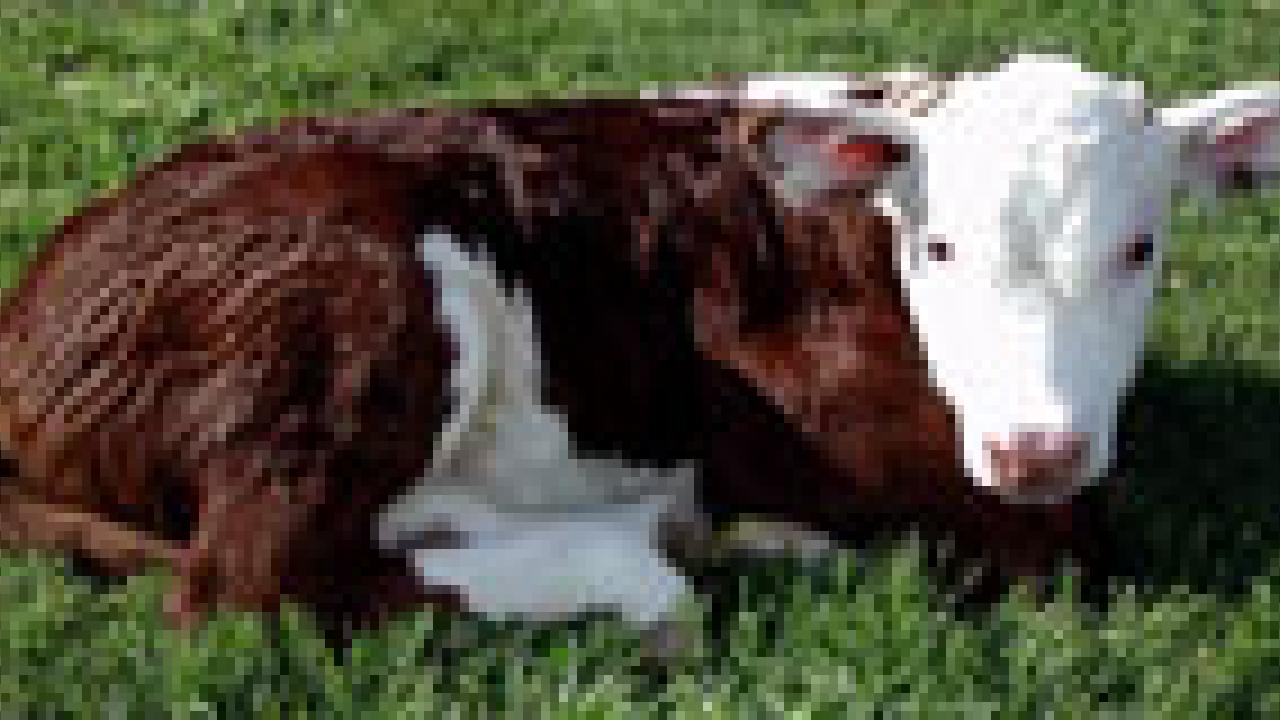A cloned Hereford calf named Rosie is doing well a week after its birth at the University of California, Davis.
The reddish-brown and white female is part of an ongoing study aimed at better understanding which types of adult cells are best suited for cloning cows. The researchers hope that studies in this area will help improve the cloning technique so that it eventually can be used in animal agriculture to produce more healthful meat and milk products.
"We're encouraged that the calf is feeding well and doing what other calves do," said Gary Anderson, professor and chair of the UC Davis animal science department.
The new calf weighed about 100 pounds at birth, a bit larger than the average 75-80 pounds usually seen in Hereford calves. Cloned calves are often unusually large, but this calf is considered to be within the normal range for her breed.
After the calf was delivered, it was attended to by a team of veterinarians and during the past week has been cared for and carefully monitored by veterinary students.
"Rosie is a bright, energetic, healthy calf, acting just like any other newborn calf," said Cynthia Batchelder, an animal science doctoral candidate, who is conducting the cloning project with Anderson. "But young calves are especially vulnerable to respiratory, digestive and umbilical infections, so we will continue to watch her closely."
The calf was cloned from a cell taken from the ovary of a 16-year-old reddish brown Hereford cow. As would be expected, the calf has the same coloring and markings as the cow from which she was cloned.
This is the second calf cloned and delivered at UC Davis. The first was born in August 2001 and died three days later due to multiple birth defects.
The new calf is expected to remain at UC Davis for about two months, then will go home to a Northern California ranch where the cow from which she was cloned also lives.
Cloning is a technique used to produce a genetic replica of another living being. Agricultural scientists are studying cloning in hopes of developing that technique to the point that it can be used to produce many copies of animals that have valuable qualities. For example, it might be desirable to clone a cow whose milk is particularly nutritious or has a protein composition that is especially good for making cheese or other processed dairy foods. Cloning also could be used to genetically engineer cows and sheep that can produce pharmaceuticals in their milk.
It's estimated that more than 150 cloned calves have been born at about 10 laboratories around the world. In the United States calves have been cloned at Texas A&M, University of Wisconsin, University of Tennessee, University of Connecticut, the University of Georgia and several private companies.
The current technology used to produce clones in the laboratory is called nuclear transfer because it is based on moving the nucleus of one cell into another cell.
The nucleus -- the center part of the cell that contains its DNA -- is withdrawn from an unfertilized egg cell of one cow. Then a cell is taken from skin or other tissue of a donor animal of the same species and placed next to the "empty" egg.
An electrical charge is then applied, causing the two cells to fuse together. This transfers all of the genetic information that controls cellular development from the nucleus of the donor cell to the fused egg and triggers cell division to begin. The fused egg is placed in a lab dish with the appropriate nutrients. Eventually the resulting embryo -- which is a genetic copy of the animal that donated the nucleus -- is transplanted into a surrogate mother.
Media Resources
Pat Bailey, Research news (emphasis: agricultural and nutritional sciences, and veterinary medicine), 530-219-9640, pjbailey@ucdavis.edu
Gary Anderson, Animal Science, (530) 752-1682, gbanderson@ucdavis.edu
Cynthia Batchelder, Animal Science, (530) 752-7544, cabatchelder@ucdavis.edu
